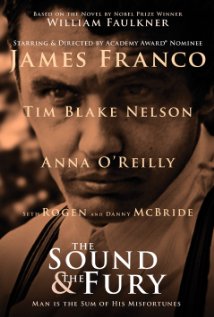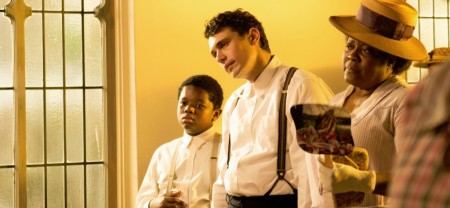Stockholm Film Festival: The Franco and the Faulkner
 Thursday, November 13, 2014 at 1:00PM
Thursday, November 13, 2014 at 1:00PM Glenn has been attending the 25th Stockholm Film Festival as a member of the FIPRESCI jury. Today he looks at James Franco's latest creative endeavour, 'The Sound and the Fury'.
 James Franco’s latest isn’t a part of the films I was sent to Sweden to judge, but in my apparent need to one day become the pre-eminent expert on the 36-year-old’s career, I decided to find time for The Sound and the Fury. His second Faulkner adaptation after last year’s As I Lay Dying shows that Franco is improving as a director when it comes to the creation of coherent and engaging cinematic worlds, but while somebody like the equally fast-moving Xavier Dolan is able to take his inspirations and weave them throughout his own auteurial style, Franco’s films still feel like he’s merely copying what he has seen elsewhere without putting his own stamp on it.
James Franco’s latest isn’t a part of the films I was sent to Sweden to judge, but in my apparent need to one day become the pre-eminent expert on the 36-year-old’s career, I decided to find time for The Sound and the Fury. His second Faulkner adaptation after last year’s As I Lay Dying shows that Franco is improving as a director when it comes to the creation of coherent and engaging cinematic worlds, but while somebody like the equally fast-moving Xavier Dolan is able to take his inspirations and weave them throughout his own auteurial style, Franco’s films still feel like he’s merely copying what he has seen elsewhere without putting his own stamp on it.
For instance, his misguided debut film about the murder of Sal Mineo, titled simply Sal, was Gus Van Sant lite to say nothing of My Own Private River, while last year’s Child of God was incredibly indebted to Debra Granik’s Winter’s Bone. Faulkner’s novel, from what I gather, isn’t the easiest to make work on screen and Franco with his editor Ian Olds have chosen an elliptical form that layers flashbacks upon memories within sun-drenched images of nature and human innocence to symbolize how precious this life is. It’s style is representative of the source material’s structure, but it comes off visually as derivative of other films, predominantly The Tree of Life and it’s swirling, time-skipping narrative.
For those unfamiliar, The Sound and the Fury tells the story of the Compson family, a formerly rich and powerful Mississippi dynasty who are devoured by misfortune and resentment. Divided into three chapters (the book’s fourth chapter is integrated throughout), each devoted to one of the family’s three brothers: Benjy (Franco, clearly having never seen Tropic Thunder), Quentin (newcomer Jason Loeb, anchoring the film’s strongest segment) and Jason (a slimy, cowardly Scott Haze, much improved over his similarly hot-tempered role in Franco’s Child of God). It was wise of Franco to not indulge in a lavish adaptation, keeping the ensemble low-key (he does, however, find time for cameos by Seth Rogen and Danny McBride – most unexpected Pineapple Express reunion ever!). Yet at the same time his devotion to the novel means more interesting characters don’t get the attention they deserve.

Ahna O’Reilly as scandalous sister Caddy, Joey King as her deserted child, and Loretta Devine as the long-serving family maid are all impressive – Devine especially gets one killer showdown with Haze that begs for a director to capitalize better on her intense face. Despite their stories feeling redacted with large blank holes of history left untouched, they are the more emotionally and dramatically complex characters. Perhaps a narrative shift to these unsung female characters is the brave direction Franco needed to allow his film to truly separate itself from both the novel and similarly-themed films. The film looks handsomely made, the period details appearing nicely deteriorated, but in terms of impact I was left wanting. The Sound and the Fury is a step in the right direction for Franco the director, but it still doesn’t quite suggest he’s on the verge of something truly great. Yet, at least.



Reader Comments (3)
James Franco no longer resembles James Dean to me. Now he reminds me more of Warren Oates, which is all to the good.
In a way, I think it's probably good that Franco hasn't found his directorial style yet. Sometimes if you develop a style too early it can calcify or go out of fashion, which can be hard if you identify too much with it. Maybe Franco might even become one of those directors (who I love) who have an invisible hand, you don't see them working but everyone in the movie is at their best.
I wish Franco good luck. Keeping on working and trying and being curious and ambitious- more power to him.
I tried to read this novel when I was young, and it was a struggle that I couldn't win. I'd like to give it another try. Even for a great director, adapting this would be a daunting challenge. Jimmy probably should have stuck to something a bit more basic.
brookesboy, I think the screenwriter (not Franco) does a good job of wrangling it under control, but the way it's done will not endear itself to anybody beyond a very incredibly niche audience.
Adri, that can be true about a director's style (I still love it, but look what's happened to Sofia Coppola in terms of public reaction to her films). However, for a person with such an overflowing artistic brain (whether we like it or not), it's disappointing then that so many of his films just look so much like a shrug.